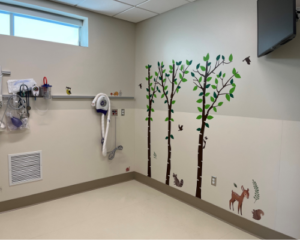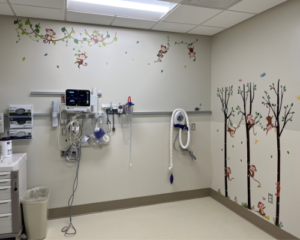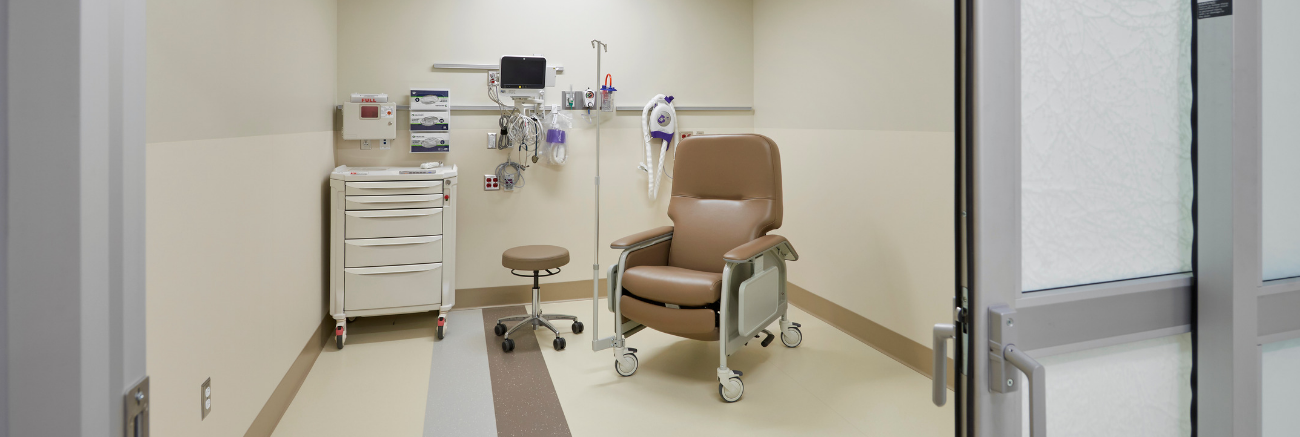Patient Resources
At Edina Specialty Surgery Center, our skilled team of surgeons provide same-day surgery to children and adults whose treatment does not require an overnight hospital stay. The team of experienced anesthesia staff, registered nurses, surgical technicians and surgeons work together to ensure each patient experiences superior surgical results in a safe, comfortable and private setting.
We look forward to caring for you in our same-day surgery center, where you will:
- Have high-quality surgical care without an overnight stay
- Recover in the familiar surroundings of home, rather than a hospital
- Spend less time away from work, family and friends
Before Surgery
- YOU MUST HAVE A PREOPERATIVE PHYSICAL EXAM AND MEDICAL HISTORY WITH YOUR PRIMARY CARE GIVER WITHIN 30 DAYS BEFORE YOUR SURGERY. Check with your surgeon or primary care giver to schedule this appointment.
- Ask your primary care giver if any of your medications, including blood-thinners and diabetes medicine, should be held prior to surgery.
- Please notify us and your primary care giver if there are any changes to your health, including but not limited to: fever, chills, nausea/vomiting, sore throat, congestion or runny nose, sore throat, diarrhea, new loss of taste or smell, body aches.
- You will receive a phone call between one and three days before your surgery from a nurse at Edina Specialty Surgery Center to review your health history and provide you with your surgical time. If you miss this phone call, the nurse will leave a detailed voicemail with instructions.
- Please arrange to have someone drive you to and from your surgery. Unless instructed otherwise, you must have a responsible adult (18 years and over) stay with you for 24 hours after leaving our center.
*Please be aware that due to the nature of our surgery schedule, your arrival time and time of operation may change up to one day prior to your surgery*
Night Before Surgery
- Do not eat or drink anything (including chewing gum and hard candy) eight hours prior to the start of your surgery. You may continue to drink small amounts of water up to two hours prior to the start time of your surgery. Failure to comply with this will result in a delay or cancellation of your surgery.
- If instructed by your surgeon, wash with special soap (hibiclens, dial).
Day of Surgery
- Unless otherwise instructed by your primary care giver, take all medications at their normal time with a small sip of water.
- Remove any jewelry and body piercings.
- Please do not wear excessive makeup, perfume (including essential oils), or scented lotion. If you are having surgery on your chest area, do not wear deodorant or antiperspirants.
- Wear comfortable clothing that is easy to remove and put on.
- Arrive at our center one and one half hour before your scheduled surgery time unless instructed otherwise.
- Lockers will be available for your belongings but please do not bring any valuables with you.
What to Bring
- Copy of your medical history and physical exam if provided to you
- Copy of any Health Care Directive or Living Will if you have one
- Copy of any tests including EKG, Heart ECHO or labs if provided to you
- Any respiratory inhalers
- CPAP or BiPAP machine
- Any eye drops given to you by your surgeon
- Your insurance information
- Photo ID
What Not to Bring
- Do not bring any valuables, such as jewelry, watches, tablets or laptops
- Remove all body piercings before you arrive at the surgery center
- Do not wear makeup. For example, mascara, eyeliner, eye shadow
- Do not wear perfume or cologne
The surgery center is not responsible for any lost or misplaced personal items
Edina Specialty Surgery Center front doors open at 5:30 a.m., take elevators to second floor Surgery Center and check- in at the front desk.
A nurse will take your health history, temperature and blood pressure to prepare you for surgery.
The anesthesiologist and your surgeon will meet with you and answer any questions before surgery.
Edina Specialty Surgery Center Information
- 4100 Minnesota Drive #200, Edina MN 55435
- P: 952-996-9600 I Fax: 952-996-9601
- Front lobby hours of operation – 5:30am to 4:30pm
Directions
- From the North
- Head south on MN-100. Take the Industrial BLVD exit toward W 77th St.
- Use the left 2 lanes to turn left onto W 77th St/Edina Industrial BLVD.
- Continue to follow W 77th St.
- Turn left onto Minnesota Drive Destination will be on your left.
- From the West
- Head east on 1-494 E.
- Take exit 68 for County Rd 17/France Ave Use the left 2 lanes to turn left onto County Rd 7/France Ave S.
- Turn left onto Minnesota Drive Destination will be on your right.
- From the South
- Head northwest on l-35W N.
- Take exit 98 for Interstate 494 W/MN-5 W Merge onto 1-494 W/MN-5W.
- Take exit 68 for County Road 17/France Ave Turn right onto France Ave S.
- Turn left onto Minnesota Drive Destination will be on the right.
- From the East
- Head west on 1-494 W.
- Take exit 68 for County Road 17/France Ave Turn right onto France Ave S.
- Turn left onto Minnesota Drive Destination will be on the right.
COVID-19 PATIENT SAFETY INFORMATION
At Edina Specialty Surgery Center, the health and safety of our patients and staff is always our number one priority. With this in mind, we are continuing to closely monitor the COVID-19 (novel coronavirus) outbreak. In addition to staying in constant contact with the Minnesota Department of Health, we are staying up-to-date with the latest information from the Centers for Disease Control (CDC) and World Health Organization (WHO).
APPOINTMENTS/VISITORS:
- In an effort to keep everyone safe, we ask that all patients follow the below testing guidelines:
- Patients who are symptomatic or who have recently been exposed to someone with COVID-19 will be required to test prior to surgery. At home tests are allowed to show a negative result prior to surgery.
- In an effort to keep everyone safe, we are asking all patients/visitors to NOT enter the building, and instead call to reschedule appointments if the following apply to you:
- Had a fever of 100.4 or higher in the 24 hours prior to your appointment
- Feel ill on the day of your appointment.
- Current masking recommendations will be discussed with patients as part of the pre-operative communication. Please let us know if you would like our staff to wear a mask during your episode of care. If you wish to wear a mask and do not have one; we can provide a mask pending our supply availability. Of note, these are not N95 masks.
- COVID-19 testing protocols have been put in place for all surgery patients receiving treatment inside ambulatory surgery centers (ASCs).
VISITOR RESTRICTIONS:
- We are allowing ONE visitor to accompany a patient into the building.
The steps to protect yourself from Coronavirus (COVID-19) are generally the same as those for the flu:
- Wash your hands frequently with soap and water for at least 20 seconds, or with an alcohol-based hand sanitizer if soap and water are not available.
- Avoid close contact with sick people.
- Cover your cough or sneeze with a tissue or your elbow.
- Clean and disinfect frequently touched objects and surfaces using a household cleaning spray or wipe.
For information on prevention, symptoms and what to do if you’re feeling sick, please call the Minnesota Department of Health COVID-19 Hotline at 651-201-3920.
Children – Patient Information
If you wish to visit our facility for a tour before surgery, please call 952.996.9600 to set up an appointment.
- Only ONE parent is allowed to wait in the waiting area during surgery, this is required for ALL children under the age of 18 in case the medical team needs to contact you. When the surgery is complete the surgeon will meet with you to discuss your child’s procedure.
- Bring any comfort items for your child (blanket, toy, pacifier, etc.).
- Bring an empty bottle or sippy cup for after surgery.
See below for pictures of our two pediatric patient rooms.


Eyelid/Blepharoplasty Surgery Discharge Instructions/Expectations
Anesthesia Instructions Following Surgery:
- You should get plenty of rest for the next 24 hours. Avoid strenuous or risky activities. You may feel lightheaded. If so, sit for a few minutes before standing. Have someone assist you when you get up.
- You must make arrangements to have a responsible adult stay with you for at least 24 hours following your surgery.
- Do not drive or operate equipment for 24 hours.
- Do not drink alcohol for 24 hours.
- Do not sign legal documents or make important decisions for 24 hours.
- Be sure to drink enough fluids. Move to a regular diet as you feel able.
- Any questions of medical nature, call your physician.
Physician instructions following surgery:
Wound Care:
Immediately following surgery, you should begin to apply ice compresses. Apply a cold gel pack or wrap a clean washcloth around a cup of crushed ice in a plastic bag (a bag of frozen peas also works well) and hold the cold compresses directly against the closed eyelids. Apply cold pack during awake hours as often as you can, for a minimum of six times daily, for no longer than 15 minutes at a time. Continue cold compresses every day until the bruising and swelling begin to subside. This can vary for each patient, but three 3 days may be common.
*Dr. Nelson/Dr. Baker patients: After your swelling and bruising have begun to subside, hot compresses should be applied. Take a clean washcloth and wring it out in hot water (as warm as you can tolerate comfortably). Hold this warm compress against the closed eyelid(s) at least six times per day for 15 minutes. Continue using hot compresses until your post op appointment or instructed otherwise.
*Dr. Sanderson patients: Apply maxitrol 4 times per day or as otherwise directed.
What to Expect:
You should expect some slight oozing of blood from the incision site over the first two to three days after surgery. Swelling and bruising will occur for one to two weeks or longer. You may also experience itching and tearing during the first several weeks after surgery. This is part of the normal healing process
Activity:
- Avoid heavy lifting, strenuous physical exertion causing panting or jarring, or vigorous exercise for one week after surgery. You may resume regular activities as tolerated.
- You may shower and wash your hair on the day after surgery; be careful to avoid getting shampoo in your eyes. Avoid getting the operative area excessively wet; gently “dab dry”, DO NOT RUB.
- While your eyes are still swelling, it is recommended you sleep on your back and elevate your head with 2-3 pillows or equivalent to 45 degrees.
Medication:
If the doctor has given you some medications to take after surgery, please take these according to the instructions on the bottle. Pain medications may make you drowsy so do not drive, operate heavy machinery, or use alcohol while taking it. When you feel that you do not need the prescription pain medication, you may substitute Extra Strength Tylenol for mild pain by also following the directions on the bottle. If you were not prescribed pain medication, the use of Extra Strength Tylenol is recommended. Do not take aspirin or ibuprofen (Motrin, Advil) containing products for 3 days, unless otherwise advised by your physician.
You may have been prescribed some ointment to use after surgery. Apply this ointment to the suture line(s) and/or in the eyes as directed. This ointment may cause blurring of vision, but will not harm your eye.
Questions:
Please call your surgeon’s office if you are unable to establish vision in the operative eye, you are experiencing heavy bleeding that will not stop with gentle pressure, or you have any signs of an infection (greenish/yellow discharge or progressive redness).
Cataract Surgery Discharge Instructions/Expectations
Anesthesia Instructions Following Surgery:
- You should get plenty of rest for the next 24 hours. Avoid strenuous or risky activities. You may feel lightheaded. If so, sit for a few minutes before standing. Have someone assist you when you get up.
- You must make arrangements to have a responsible adult stay with you for at least 6 hours following your surgery.
- Do not drive or operate equipment for 24 hours.
- Do not drink alcohol or take any medications not prescribed, including illicit drugs, for 24 hours.
- Do not sign any legal documents or make important decisions for 24 hours.
- Be sure to drink enough fluids. Move to a regular diet as you feel able.
- Any questions of medical nature, call your physician.
Physician Instructions Following Surgery:
- Do not rub your eye.
- If your surgeon prescribed eye drops, start using them when you get home. Take them as prescribed until they are gone. Remember to bring them to your follow up appointment the day after surgery.
- Wear the clear plastic shield for protection over the operative eye for nights or during naps.
- Keep the operated eye dry. You can wash your hair, shower, or bathe, but keep the operated eye closed while doing so. Soap in your eye is uncomfortable but not dangerous.
- Avoid heavy lifting (anything requiring you to strain) excessive bending over, or strenuous activity for 1 week.
- Stay out of dirty or dusty environments for 1 week.
- No swimming pools, hot tubs, saunas for 10 days.
- Avoid eye makeup and lotions/creams around eyes for 10 days.
- You may read, write, watch television as you desire.
- Light sensitivity may be noticed and is normal. Sunglasses may be worn for comfort.
- You may resume all prescribed medications as directed by your primary care physician.
Contact your Physician’s office if you experience:
- Any sudden vision change or rapid loss in vision.
- Nausea, severe headache, or increased eye pain not controlled with Tylenol or Advil.
- Increased amount of floaters (black spots in front of vision).
- Any sign of infection (pus, increasing redness, reduced vision, increasing pain, worsening light sensitivity).
Tylenol (Acetaminophen)
- Do not exceed 4,000 mg in 24 hours
Frequently Asked Questions:
1. How soon after surgery will I be able to see?
Some people see beautifully hours after surgery, many people don’t see well for a few days or a few weeks or in rare cases months. If the vision is gradually improving after surgery that is a good indication that the vision will eventually clear. It is important not to panic in the first 24 hours after surgery as there is usually pupillary dilation and corneal swelling that limits vision.
2. How soon after surgery can I drive?
You can drive 24 hours after surgery if you have had any anesthesia or sedation.
3. How do I keep the shield over my eye?
You can secure the shield with two strips of tape from the middle of your forehead to your cheek. The extension on the shield goes over the bridge of the nose. A roll of tape should have been sent home with you after surgery.
4. What if I don’t wear the shield?
You will be at an increased risk of infection, complications and vision loss.
5. My eyes feel scratchy, is that normal?
Yes, it is normal but varies from patient to patient. It is expected for the first 48 hours. You may take Tylenol or Advil (ibuprofen) to help with this. The eye can be dry for weeks or even months after surgery causing a sandy, gritty feeling and the vision may be affected. If this persists for more than a few weeks after surgery you should call the doctor’s office.
6. How soon can I have my other eye operated on?
At least one week and preferably two to let the first eye heal and make sure that the vision is improving as expected before doing surgery on the second eye.
Retinal Surgery Discharge Instructions/Expectations
Anesthesia Instructions Following Surgery:
- You should get plenty of rest for the next 24 hours. Avoid strenuous or risky activities. You may feel lightheaded. If so, sit for a few minutes before standing. Have someone assist you when you get up.
- You must make arrangements to have a responsible adult stay with you for at least 24 hours following your surgery.
- Do not drive or operate equipment for 24 hours.
- Do not drink alcohol for 24 hours.
- Do not sign legal documents or make important decisions for 24 hours.
- Be sure to drink enough fluids. Move to a regular diet as you feel able.
- Any questions of medical nature, call your physician.
Physician Instructions Following Surgery:
Will I have pain?
Some discomfort is normal and expected following surgery. The first few days after surgery you may need to use pain pills. If a pain pill has not been prescribed for you, taking Tylenol (acetaminophen) or Advil (Ibuprofen) regularly, as directed on the bottle, may help prevent pain. A foreign body sensation in the cornea of the eye can be commonly caused by sutures placed at surgery, which will go away in one to two weeks.
Do I need to wear an eye patch?
You will leave here with an eye patch secured in place. It will be removed at your post op appointment and further instruction will be given for post-operative care to the eye. You will not begin any eye drops today.
Will I need to use eye drops?
You will be using several different kinds of eye drops or ointment after your post op appointment. This may include a dilator, antibiotic, steroid, and/or a pressure drop. Bring all eye medications with you to each visit.
How much drainage should I have?
You may expect a moderate amount of drainage for a week, especially pink-tinged on the patch the first day. The lids can be cleaned with a clean washcloth and gentle soap or diluted baby shampoo. Wipe the eyelids gently from the nose outward. Some blood in the tears is a normal.
Will there be swelling?
Some swelling is normal for about a week or two. Applying a cool compress using a clean washcloth for 5 – 10 minutes several times a day may reduce the swelling and make you more comfortable. You may have some swelling of both eyes, especially if face down positioning is required. The white part of the eye may appear red or bloody and even get worse a few days after surgery. Though the bright red appearance can look frightening, it is a normal finding early after surgery and will resolve in a few weeks.
How long will it take for my vision to improve?
Your vision should gradually improve, but it may take months to regain your best vision. If an air or gas bubble was injected into the eye at the time of surgery, this will blur your vision significantly at first. As the bubble becomes smaller, it will may cause a black line in your vision that moves as you move your head or it may break up into several smaller bubbles. You may notice floaters or double vision after your surgery. It will take from a days to weeks for the bubble to dissolve and be replaced by clear fluid.
Are there any physical restrictions after surgery?
- Swimming pools, hot tubs, etc. should also be avoided for 3 to 4 weeks due to the risk of infection, along with heavy lifting and contact sports. Consult with your physician at your post op appointment for specific activity privileges.
- Depending on the type of work, you may return to work within a few days, unless it involves physical activity or driving.
- Generally, driving can be resumed in several days if you have good vision in your other eye.
- You may watch TV, use computer, read, etc. It may be uncomfortable, but will not cause any damage.
- You may go outside as usual. If conditions are windy, wear an eye pad to avoid getting dust the eye.
- You may shower or bathe, but do not get your patch wet. Do not use make-up or creams around your eyes for several weeks
What if I had a bubble placed in my eye?
Gas/air bubbles are often used in retina surgery to either close holes or help keep the retina attached. The bubble rises up and presses against the highest point of the eye. Depending on the area of damage to the retina, you may be asked to maintain a certain position, frequently face down.
- You should avoid sleeping on your back until the bubble has totally dissolved and you have been given permission from your surgeon.
- The information below applies to the placement of gas and air bubbles but does NOT usually apply to the placement of an oil bubble:
- You cannot fly in an airplane or drive into the mountains as long as the bubble remains in your eye.
- You will have a green medical alert band placed on your wrist. This should not be removed until the doctor gives you permission or removes it for you. If you should require any other surgery, under general anesthesia, some anesthetic agents can make the bubble expand and damage your eye.
You should call your doctor if you have any of these symptoms, you may need to be examined:
- You notice a sudden decrease in your vision.
- Have severe pain or pain increases rather than subsiding.
- Green thick discharge appears.
- Your vision gets darker/dimmer or you notice a new black curtain that is not the gas bubble.





